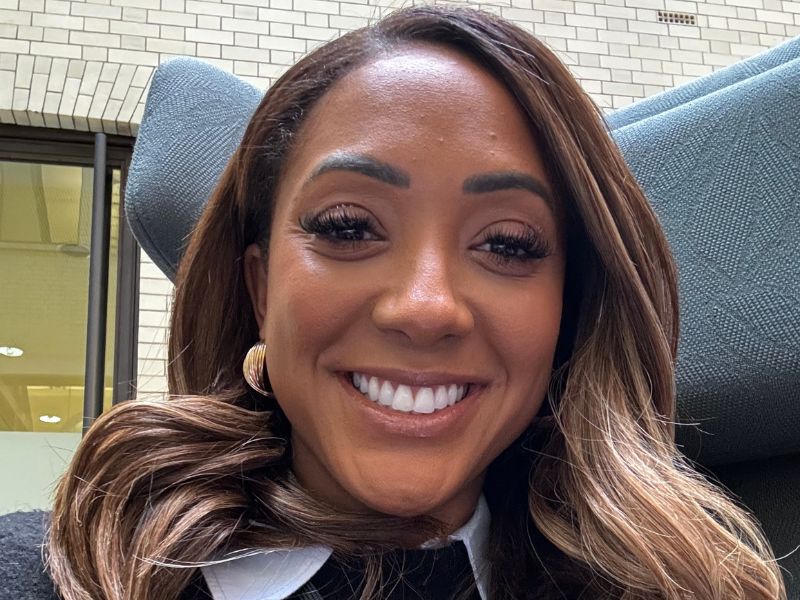Leanne Maskell is an ADDCA qualified ADHD Coach and the Director of coach training company ADHD Works.
Diagnosed with ADHD at the age of 25, Leanne raises awareness about ADHD and provides training and support for those going through diagnosis and beyond. Leanne worked as a legal policy advisor for The Law Society working on immigration, mental health and disability legislation for Coronavirus and Brexit policies, and has delivered talks to the World Health Organization on improving global access to diagnosis and support for those with ADHD. Through ADHD Works, Leanne provides coaching, training and retreats for individuals and organisations – with clients like Microsoft, Yahoo and Paperchase – for ADHD-ers to understand and be empowered by their ADHD, and for companies to support and harness neurodivergence in the workplace. Leanne is the author of best-selling book ADHD: An A to Z.
Tell us a bit about yourself, background and your current role
I’m Leanne, 30 years old, and live in London. I’ve modelled since age 13 for brands like Vogue & ASOS, studied law, and written 3 books, including ‘ADHD: an A to Z’, which I wrote after being diagnosed age 25. This diagnosis meant I could focus long enough to get a job, so I worked in mental health, disability and immigration legal policy for 2.5 years before becoming an ADHD Coach & setting up my coach training company ADHD Works.
My current role includes everything from coaching groups and individuals with ADHD, training new ADHD coaches and companies like Microsoft on neurodiversity, creating courses, and running ADHD retreats
Did you ever sit down and plan your career?
No. I never had any idea of what I wanted to do as a teenager (which now makes sense, given the undiagnosed ADHD and struggle to plan ahead!) and it caused me a lot of anxiety after graduating from university. I was desperate for a job that didn’t require me to starve myself (as a model!), but couldn’t decide what to do. This meant I instead applied for every single job that looked vaguely interesting – from MI6 to publishing, shipping law to restaurant PR!
I’ve had a squiggly career that made no sense at the time, but looking back it all fits into place. Every seemingly random decision has led me to the next stage, and now I just embrace it – who knows what I’ll be doing this time next year!?
Have you faced any challenges along the way?
Trying to decide ‘what to do with my life’ was absolute hell and drove me to become suicidal, because I felt like I just didn’t fit into the rest of the world. I constantly started and quit jobs, feeling intense shame every time. This is what eventually led me to be diagnosed with ADHD, because I finally accepted that this wasn’t ‘normal’ – or necessarily my fault.
I couldn’t figure out what job to do, how to write a CV or cover letter without changing it 10 times per application, and almost cancelled my law job interview because I was having such terrible panic attacks about it.
What has been your biggest achievement to date?
My biggest achievement to date has been getting – and leaving – my law job. My unusual career background of modelling, haphazard work experience, and ‘writing a book’ felt like I was presenting myself as someone who’d just escaped from the circus, but the people who interviewed me couldn’t have been kinder.
I left feeling as though there was hope for me in the ‘real’ world, so grateful that they didn’t tell me off for turning up and somehow tricking them into interviewing me. When I was offered the job, I genuinely couldn’t believe it. I literally took out an 8 month contract on a flat I couldn’t afford across the road from the office because I was so determined not to quit! The same week I started, I was on the cover of the Times for publishing the Model Manifesto, but this genuinely felt like nothing in comparison to finally being able to fit into a ‘normal’ job.
Ironically, my biggest achievement is also realising I don’t need to fit in – I can make it up as I go along. Leaving that job to become an ADHD Coach felt like running away to join the circus, but it’s my circus!
What one thing do you believe has been a major factor in you achieving success?
My ADHD. It’s pretty obvious if you compare my career before vs after finding out I had it: I stopped trying to fit in and started embracing my strengths. Having ADHD makes me often act before thinking – and when I do get around to it, I think in a non-linear way. I can spot obvious gaps and fill them, such as by writing ADHD: an A to Z, breaking it down for people stuck on 7 year NHS waiting lists.
I initially self-published this book (misspelling the title as ‘AHD’!), which then went on to be acquired by Hachette. Having ADHD means I take risks and figure the details out later. I chase my passion, creativity and curiosity, and don’t live my life to the same rules that ‘most’ people do.
Once I started embracing this and understanding where I needed support instead of beating myself up for not being able to do certain things, my life transformed. Today, my version of ‘success’ is a life where I can do meaningful work that I enjoy on my terms – I’m not motivated by money or power, just dopamine! Learning about my own ADHD has empowered me to learn how to actually put this into practice in a sustainable and ‘successful’ way, whilst ironically working in the area by setting up ADHD Works!
How do you feel about mentoring? Have you mentored anyone or are you someone’s mentee?
I strongly support mentoring, and wish I’d had more when I was younger. I didn’t know it was possible to ask for help, and assumed it had to be through a formal ‘mentorship scheme’. An ex-boyfriend even tried to drag me into his University’s ‘career mentoring service’ which I was mortified at (luckily they were closed!) – but I remember thinking how unfair it was that they were partnered up with people doing jobs they wanted to do.
Now, I ask everybody to mentor me – some of them don’t even know it! I’ve learned I have nothing to lose by asking. Since then, I’ve had some really important mentors who have changed the course of my life. Someone I previously worked with helped me to become an ADHD coach instead of a solicitor, as they explained the reality of working in law and how unaligned this was to my hopes of working in law. Ironically I do this now anyway by training companies!
I also asked a CEO to mentor me after having several interviews for a job at their company which I’d reached the final 2 for. His mentorship was invaluable in helping me to make important business decisions along the way, which I’d never have been able to make without this insight as someone brand new to this world. I quickly learned to stop trying to ask questions I thought I ‘should’ be asking and instead ask the ones I wanted to know the answers to, like how they structure their days (spoiler: with lots of breaks)!
I also like to think I’ve mentored people throughout my life, as it’s an area I’m extremely passionate about. From one-off conversations about my career path to advice on studying law, and more ongoing situations where I’m happy to discuss any challenges that might arise, mentorship is essentially passing along information and lived experiences.
I hope the books I’ve written are a form of wider mentorship in this way. I wrote the Model Manifesto as there was no way to speak to other models or understand if certain practices were ‘normal’ in the industry, like agencies getting you into debt!
Mentorship can be extremely valuable at work, especially when trying to get into a new career, so I’d strongly recommend reaching out to people doing the things you want to do and asking them how. People naturally want to help others!
If you could change one thing to accelerate the pace of change for Gender Parity, what would it be?
I would make all child-care free. One of my best friends has recently had a baby and it’s unbelievable that it makes more financial sense for her to quit her job to look after him than to return to work. I was also advised to avoid the legal industry for this reason: it’s incredibly difficult to return to your career in the same way afterwards.
If you could give one piece of advice to your younger self what would it be?
I would tell myself it all works out in the end, so stop worrying so much.
What is your next challenge and what are you hoping to achieve in the future?
My next challenge is scaling ADHD Works so I can have a rest.
I’ve got a coaching waiting list of over 300 people and am about to finish training 25 new ADHD coaches, before training more in September, so I’m looking forward to helping as many people as possible to access the support they need. We’re also launching a workplace programme soon to be able to train hundreds of people to support ADHD at work at the same time, which is really exciting – if scary!
The business has grown extremely quickly in the last year, so I’m looking to hire a manager who can keep everything running whilst I figure out how to relax. That’s the main thing I’m hoping to achieve in the future: a break (where I don’t end up creating more work for myself)!









